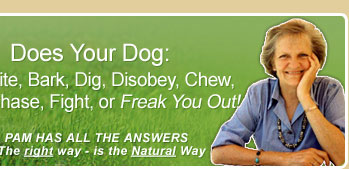Our Dogs are Our Family Members.
by Pam Whyte.
Not our victims that must submit, our trophies that must win our compliments for us, fashion items or specimens that must be be a pred-determined shape. They are, in fact, our children. When we own a dog, we are in a relationship. Dogs in Nature are born into families that are part of a close knit social system that is very similar to human families and societies. Dogs are therefore genetically equipped by Nature to live in harmony (synergise) with other members of their society. They even have laws and ground rules that pack members must adhere to in order to for the purpose of survival.
Because dogs are pre-designed to live under a well ordered social system that adheres strictly to natural principles (like unity is strenght; the leader keeps the pack fed and the pack keep the leader safe, etc.) cooperating with and giving emotional support to family members, we lose sight of this reality when we dominate, punish and/or try to coerce our best friends into submission, therefore tragically losing out on this potential for mutual harmony and loyalty.
In other words, dogs are designed for both love, affection, compassion, loyalty, and caring for and supporting one another under the authority of a leader whom they respect and trust. Within a pack of dogs under a moral code which is strictly adhered to. Political power play takes place according to complex and rigid rituals – which are actually very similar to human politics and power play. Not through winning a war. That is division, anarchy and civil war.
Dog packs are structured in many ways very similar to human societies. Indeed, all social systems function according to underlying universal principles, such as: leaders lead by example; unity is strength; the survival of a community depends on close cooperation amongst its members; children are all reared in families and the parents are their role models. Environmentalists have noted that when food is adequate, after a kill, wild dogs actually feed their puppies before the adults eat, and even care for their weaker members. A pack of dogs is in fact a cameo of an ideal social system. Which is why we are so drawn to one another - because we can identify with one another’s emotions and need for love and companionship.
When we own a dog we are in a very unique relationship because this relationship exists between two different species (cano-sapiens, and homo-not-so-sapiens) – who do not even speak one another’s language. Members within a pack of dogs or wolves communicate with each other through the use of a highly developed and complex networking system made up mainly of body signals, nuances, power play and other non verbals. And when we learn to understand these natural and simple signals, (many of which are actually part of our own human repertoire of non verbals) we are able to enjoy and control our dogs to the full.
However, this does not mean that our dogs do not understand our words! Through living very closely with humans all of their lives, yet still possessing their finely tuned survival instincts, they are able to learn far more words than most dog owners give them credit for. When we chat calmly to our dog (as most dog lovers do, but few admit to – I can't think why), or speak in front of our dog, they in fact understand a great deal of what we are saying to (and about) them.
When we shift our perspective, and view the world (and at ourselves) through the eyes of our dog – dog owning immediately becomes an even more mutually enriching and exciting experience as well as giving us so much more control over our dogs.
An orderly social system is interconnected by:
- the social cement of love and loyalty;
- the politics of status and leadership;
- the network of non verbal communication;
- and the protocol of mutual respect.
The potential for all of which are built into the DNA of each member of a pack of wolves, a pack of wild dogs - and therefore into the genes of our domestic dog. This is what has enabled them to survive through countless centuries in an “eat or be eaten”, “kill or be killed” environment - where unity is strength, so close cooperation is vital for the survival of the species.
Within this social system, leadership status is won through complex rituals and power play which all have their parallels in the power play and ego jostling of humans. Influence which has been won through these subtle signals are far more powerful than imposing our own will and logic onto our dogs, then punishing them for being confused.
When impose human logic onto our dogs - we risk destabalising their natural desire to cooperate and synergise with their pack, as well as stifling. Many dogs that are disobedient, therefore are just not hearing what we are saying. It is then only too tempting to put the blame on the dog and label the consequences of the culture clash of domestication “no ears” and “disobedience”. When they are, in reality, it is nothing more than a consequence of a one sided relationship where one side is not considering the viewpoint of the other. So what is the solution then?
It is actually very simple: Healthy relationships are all built on the foundation of meeting each other half way. There are other aliens besides dogs that we find ourselves living with. We also coexist with aliens like teenagers, toddlers, the opposite sex, different cultures, cats, a parrot or two… none of whom are on exactly the same wave length as we (and think they are). So, how do we meet our dog half way then?
On our side - we
- meet their needs;
- allow them to be who they are.
- learn their language;
in order to help them adjust to domestication, and to our way of life, as well as to develop their full personality potential.
on their side, they:
- - live by our ground rules, i.e. respect our visitors and our possessions, etc., (etc.)
- - protect us (through loyalty toward their pack members),
then we have so much more control over our dogs, plus the fact that dog owning becomes even more rewarding and enriching. And our dog is much happier and more secure.
This is an ideal that is within every dog owner’s ability to achieve. The exciting and very empowering connection which this mind shift gives dog owners gives adds an extra dimension to the already very special relationship that we have with our four legged family members. Which is why people have dogs. (And vice versa.) Most of us own dogs to be our companions – even our children. Yes, even families who have six (or more) children – to them, their dog is still their child. (So they tell me.) And if you treat your dog like a child, (because he is genetically programmed to live in families), he is equipped to simply slot into our (two legged) families. All we have to do is make dogsense (and not nonsense) to them!
So here we have a dog that is designed to live within a family, (great!); to abide by a strict moral code, (getting better all the time) under the direction of a loved and trusted leader; (are we that??) and to communicate with the other pack members with their highly developed communication system; (don’t know how to speak “Dog”) who are made for loyalty, devotion, compassion, caring, love… ( good, I want some of that) and it is our identification with these parallels of love, loyalty and affection within our own communal systems which draw us to one another. (Plus the fact that they are so darn cute.)
The very secret key to the dog’s mind is: the Law of the Jungle. So let's go to Mother Nature (who wrote the original instruction manual right there within the dogs' DNA) and you will see it work right in front of your eyes.
And once we have made this kind, easy and natural (totally non-gimmicky) mindshift – our dog will have the security of being understood, and we will have the emotional enrichment, the protection and the control over our dog that we are looking for.





